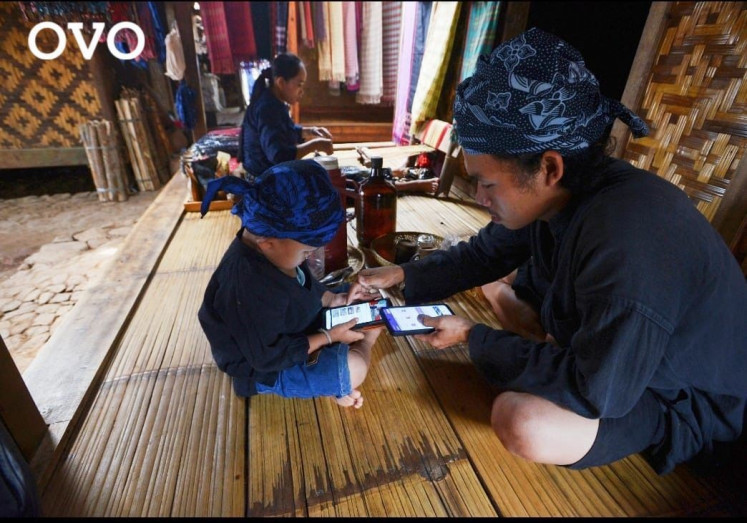Please Update your browser
Your browser is out of date, and may not be compatible with our website. A list of the most popular web browsers can be found below.
Just click on the icons to get to the download page.
Or continue login with
OVO prides itself as today’s No. 1 choice for digital payment services among users in Indonesia. A Boku Inc. report published in 2021 revealed that OVO controlled 38.2 percent of the domestic market share for digital wallets in 2020 and had the biggest user base compared to its competitors.
OVO is available on nine out of the top 10 e-commerce platforms in Indonesia and is currently used by more than 1.3 million QRIS merchants, a figure that has only grown during the pandemic. OVO is also accepted and available in more than 660 cities and regencies across the country, including cities as remote as Labuan Bajo.
“We have seen an increase in terms of users, first-timers using digital payment [services], but we also saw a significant increase in terms of the frequency of digital payment use among people who previously, for example, only used it for e-commerce or to pay the electricity bills, have now started tapping into investments and groceries through OVO,” said OVO Chief Operating Officer Eddie Martono.
Eddie credited the “open ecosystem” strategy of growing through collaborating with its partners for enabling OVO’s growth. “We grow by growing others,” he said, explaining the essence of the strategy.
One of the key strategic partnerships driving OVO’s growth is its tie-up with on-demand services platform Grab. The two companies have been collaborating since 2018 to better serve their users in support of government aims and the welfare of Indonesians.
“Such partnerships allow us to tap into wider user bases so that users do not only use OVO, but OVO plus X or OVO plus Y, or OVO plus Grab, which can incentivize them to try out OVO. We truly believe that once people try OVO, they will see the value in terms of convenience, return, flexibility,” Eddie said.
Yet, because of low digital literacy in the country, some people are still unfamiliar with digital payments and remain unconvinced of the benefits they can offer. In 2021, the Communication and Information Ministry and the Katadata Insight Center rated the country’s digital literacy index at 3.49 out of 5. . (Courtesy of OVO/.)
. (Courtesy of OVO/.)
Eddie narrowed down the problem to two key issues: trust and convenience. As regards the former, the COO assured that OVO never takes data privacy lightly, strongly believing that user data and how people use the OVO app must be protected. He stressed that OVO is invested in protecting the confidentiality of transactions for all users.
“OVO continues to develop and implement high security standards and e-KYC [electronic Know Your Customer] standards to maintain and ensure the level of security and users’ trust in the services that OVO provides,” he said. “These efforts are accompanied by awareness and education efforts, so the public will always be vigilant and careful in conducting digital activities.”
Regarding convenience, one benefit that most digital payment users have experienced is the numerous channels available to top up their digital wallets. A common misconception is that to access digital payment services, a user must have a bank account. OVO is highly accessible and convenient because its e-money service enables users to carry out digital payment transactions even if they don’t own a bank account, thus enabling them to access digital goods and services such as buying and selling on e-commerce platforms, ordering food delivery, ride hailing and more.
One of the company’s missions is to provide easy financial access to Indonesian adults, of whom 92 million are unbanked and 47 million are underbanked according to the e-Conomy SEA report by Google, Temasek and Bain & Company. Meanwhile, the Asian Development Bank (ADB) revealed that by accelerating digitally driven financial inclusion, Indonesia can boost gross domestic product 2 to 3 percent, which in turn would increase lower-class incomes by an estimated 10 percent and lead to middle-class expansion.
OVO has continued to increase the number of ways it offers for users to top up their digital wallets, both online and offline, through partnerships with Indomaret, FastPay, Mitra Bukalapak, Grab drivers and more. What used to take a week through a conventional bank now takes mere minutes, or nanoseconds via fintech or mobile banking apps.
“Going back to the mission: OVO’s mission is basically to drive financial inclusion as well as overcome unequal growth across Indonesia, [so] OVO will continue to look for different products, different [features] that could serve this objective so we never forget what we set out to do,” said Eddie.
In doing so, OVO continues to evolve by actively listening to the different needs of their users. As such, OVO recently achieved the highest customer experience score of 7.946 in the digital payments category of the 2021 Customer Experience Index Survey by SWA and Business Digest.
One product that OVO has developed to meet users’ needs is a collaboration with Bareka to offer a variety of investment products on the OVO platform, including products with an instant redemption feature that has successfully attracted OVO users, particularly first-time investors. Eddie revealed that, within one year of launching OVO Invest, the facility had registered 1 million users who represented 15 percent of total mutual funds investors in the country.
Another line of business that OVO has launched in response to user needs is OVO | Proteksi, a facility that provides access to health, life and vehicle insurance products through strategic partnerships with Prudential and other top-tier insurers.
Meanwhile, recognizing that micro, small and medium enterprise (MSME) nationwide have difficulty accessing loans, OVO provides financing through OVO Modal Usaha to help MSMEs grow their businesses.
“We recognize that the reason many of these SMEs [small and medium enterprises] have not been able to grow is because of the lack of capital, or working capital, that they need to improve, and so we are also helping them from that side,” said Eddie, underlining that MSMEs are the backbone of the Indonesian economy.
More than 95 percent of OVO's QRIS merchants are MSMEs for which the OVO payment platform has acted as a “digital gateway”, connecting them to the digital ecosystem to buy and sell their goods and services.
An MSME survey OVO conducted in collaboration with CORE Indonesia, published in 2021, found that 91 percent of MSMEs that signed up with OVO as QRIS merchants gained access to the wider OVO ecosystem, with 70 percent of respondents saying that joining OVO had significantly increased their daily transaction volume by up to 30 percent.
During the pandemic, the OVO ecosystem contributed an average 18 percent to total sales for MSMEs in facilitating cashless transactions and online marketing, as well as by providing support in digitally transforming their businesses. As much as 82 percent of MSMEs found that the OVO ecosystem benefited their businesses during this period, while 84 percent found the OVO app to be helpful. . (Courtesy of OVO/.)
. (Courtesy of OVO/.)
The OVO-CORE Indonesia survey also found that after joining OVO, eight out of 10 MSMEs became literate in banking products, who prior to joining the OVO ecosystem had no bank accounts. The level of financial literacy generally increased among MSME entrepreneurs with elementary and junior high school education, both on and outside Java, after they joined OVO.
Amongst these MSME entrepreneurs, 74 percent of those with elementary education and 78 percent of those with junior high school education were now able to set aside money for savings, an increase from 53 percent and 59 percent respectively who previously already did so before the increase of financial literacy and inclusion encouraged by OVO.
In addition, the OVO for Business program provides reimbursement and payment services for all merchants, from large multinationals to SMEs, to help reduce operational costs while increasing employee productivity.
Finally, Eddie emphasized that as an Indonesian company, OVO is committed to supporting society at large and government programs, such as the Pre-employment Card (known locally as Kartu Prakerja) program. This stimulus program set up by the Joko Widodo administration provides professional training and social assistance for workers, job seekers and the newly unemployed who were affected by the pandemic. The program disburses training and relief funds through a partnership with a state-owned bank and four e-money platforms, including OVO, which has helped disburse aid to more than 3 million nationwide beneficiaries to date.
“I think 2022 is an exciting year for OVO,” remarked Eddie. “We see 2022 as a pivotal growth moment for us, especially [now that] OVO is part of Grab, Southeast Asia's leading super app and a publicly listed company.”
As for what’s in store for the future, he said: “Number one is to continue to serve our customers, serve our partners and accelerate sustainable growth through a win-win collaboration within the OVO-Grab open ecosystem.”
This article is published in collaboration with Ovo
© 2016 – 2022 PT. Bina Media Tenggara